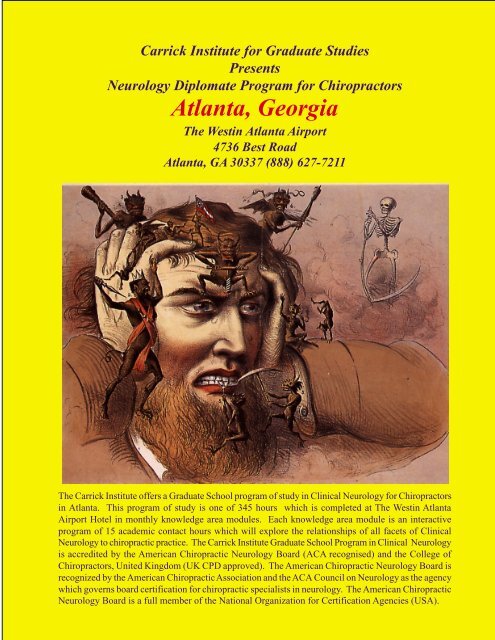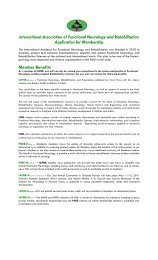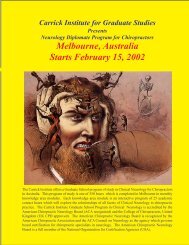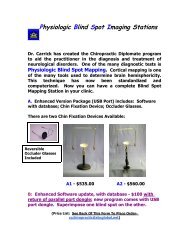Atlanta Brochure 1 - Carrick Institute for Graduate Studies
Atlanta Brochure 1 - Carrick Institute for Graduate Studies
Atlanta Brochure 1 - Carrick Institute for Graduate Studies
Create successful ePaper yourself
Turn your PDF publications into a flip-book with our unique Google optimized e-Paper software.
<strong>Carrick</strong> <strong>Institute</strong> <strong>for</strong> <strong>Graduate</strong> <strong>Studies</strong><br />
Presents<br />
Neurology Diplomate Program <strong>for</strong> Chiropractors<br />
<strong>Atlanta</strong>, Georgia<br />
The Westin <strong>Atlanta</strong> Airport<br />
4736 Best Road<br />
<strong>Atlanta</strong>, GA 30337 (888) 627-7211<br />
The <strong>Carrick</strong> <strong>Institute</strong> offers a <strong>Graduate</strong> School program of study in Clinical Neurology <strong>for</strong> Chiropractors<br />
in <strong>Atlanta</strong>. This program of study is one of 345 hours which is completed at The Westin <strong>Atlanta</strong><br />
Airport Hotel in monthly knowledge area modules. Each knowledge area module is an interactive<br />
program of 15 academic contact hours which will explore the relationships of all facets of Clinical<br />
Neurology to chiropractic practice. The <strong>Carrick</strong> <strong>Institute</strong> <strong>Graduate</strong> School Program in Clinical Neurology<br />
is accredited by the American Chiropractic Neurology Board (ACA recognised) and the College of<br />
Chiropractors, United Kingdom (UK CPD approved). The American Chiropractic Neurology Board is<br />
recognized by the American Chiropractic Association and the ACA Council on Neurology as the agency<br />
which governs board certification <strong>for</strong> chiropractic specialists in neurology. The American Chiropractic<br />
Neurology Board is a full member of the National Organization <strong>for</strong> Certification Agencies (USA).
The Chiropractic profession since its beginning has always had its roots in clinical neurology. This<br />
curriculum has been <strong>for</strong>mulated so that those Chiropractors who desire a superior knowledge of neurology<br />
might obtain a standard which will enable them to better care <strong>for</strong> their patients and become referral<br />
sources <strong>for</strong> neurological diagnosis. Each module has been assigned 15 credit hours. The completion of<br />
our 345 hour Diplomate Program in Neurology will culminate in a thorough knowledge of clinical<br />
neurology qualifying the Doctor of Chiropractic to serve his/her patients, profession and society in a<br />
competent specialized manner. Our program also qualifies chiropractors to be eligible to sit <strong>for</strong> the<br />
diplomate examination of the American Chiropractic Neurology Board. All <strong>Carrick</strong> <strong>Institute</strong> faculty<br />
are clinicians who are board certified in a health care discipline. They will introduce the subject material<br />
in integrated sections of breadth, depth and application. There will be a correlation of chiropractic<br />
technique throughout each module. All areas of breadth, depth, application and technique are interwoven<br />
with an emphasis on the art of Chiropractic application. Ours is an immersion course of integrated<br />
materials in a problem oriented mode of learning. Our <strong>Graduate</strong> School Program is not one which<br />
teaches the Chiropractor how to refer difficult neurological cases but one which emphasizes and teaches<br />
the treatment of the human nervous system using non pharmaceutical and non surgical techniques.<br />
Clinical Neurology will be explored and the breadth, depth and clinical applications will be associated<br />
with practicums and contact technique groups <strong>for</strong> each knowledge area module.<br />
Course schedule Saturday Course schedule Sunday<br />
Lecture 08.00 AM - 10.00 AM Lecture 8.00 AM - 10.00 AM<br />
Break 10.00 AM- 10.15 AM Break 10.00 AM- 10.15 AM<br />
Lecture 10.15 AM- 12.15 PM Lecture 10.15 AM- 12.15 PM<br />
Lunch 12.15 PM- 1.15 PM Break 12.15 PM- 12.30 PM<br />
Lecture 1.15 PM- 3.30 PM Lecture 12.30 PM- 1.30 PM<br />
Break 3.30 PM- 3.45 PM Practicum 1.30 PM- 3.00 PM<br />
Lecture 3.45 PM- 6.00 PM<br />
Break 6.00 PM- 6.15 PM<br />
Practicum 6.15 PM- 7.30 PM<br />
Course Summary:<br />
801.. Neuron Theory & Receptor Activation: Advanced components of neuronal structure and activity will be reviewed<br />
with emphasis on the relationship between environmental potentials and their effects on the central nervous system. Clinical<br />
applications of the breadth and depth of in<strong>for</strong>mation will be emphasized.<br />
802.. Neuromuscular Applications: Emphasis will be placed on the structure and function of the motor system in relationship<br />
to receptor activation. The relationship between brain/muscle spindle sensitivity/gain and muscle tone will be explored.<br />
Methodology concerning brain based activation of the neuromuscular system will be presented.<br />
803.. Peripheral Nervous System: Structure and function of the peripheral nervous system will be reviewed with emphasis<br />
on the clinical syndromes most commonly associated with lesions in the system. The central consequences of such<br />
lesions will be discussed in relationship to neuronal function thus developing new methodologies of diagnosis and treatment.<br />
804.. Spinal Cord: Detailed review of the structure and function of the spinal cord with emphasis on clinical syndromes.<br />
Also to be presented is structured methodology to differentiate between various clinical syndromes directly and or indirectly<br />
involving the spinal cord. Applications in the treatment of the spinal cord injured patient will be explored.<br />
805.. Reflexogenic Systems: Review of the structure and function of spinal cord reflexes from monosynaptic to cross cord<br />
reflexes. Clinical applications will we emphasized in relationship to the use of modalities in the treatment of central and<br />
peripheral based disorders of muscle tone.
806.. Autonomic Nervous System: Emphasis will be placed on the structure and function of the ANS in relationship to<br />
respiratory, cardiovascular, gastrointestinal, and genitourinary function and pathology. Autonomic concomitants associated<br />
with central and peripheral lesions will be reviewed. Clinical methodology involving diagnosis and treatment of<br />
neurological dysfunction of the ANS will be reviewed.<br />
807.. Cerebellar Cortices: Review of the major afferent and efferent projections of the cerebellum as well as the central/<br />
peripheral consequences of cerebellar pathology. The relationship of labyrinthine integration to occular movement will be<br />
discussed in detail with emphasis on its clinical application.<br />
808.. The Brain & Its Environment: Review of the internal and supportive structures of the brain with emphasis placed on<br />
the major afferent and efferent projections associated with brain activity. Lesions of the supportive structures of brain and<br />
the clinical methodology used in determining brain vascular integrity will be discussed. Applications specific to brain<br />
based treatments will be explored in detail.<br />
809.. Cranial Nerves: Complete review of the structure and function of the cranial nerves with emphasis on their clinical<br />
syndromes. Applications and procedures specific to this area of the nervous system will be covered in detail both didactically<br />
and practically.<br />
810.. Lobes of the Brain: Review the basic functions and structures associated with the frontal, parietal, temporal and<br />
occipital lobes. Methodology involving the use of optokinetic stimulations and other brain based diagnostics and therapeutics<br />
will be reviewed.<br />
811.. Neurological Diagnosis: Presentation of a structured <strong>for</strong>mat in approaching the neurological examination. Emphasis<br />
will be placed on reviewing the most common syndromes one may encounter during the practical portion of the exam as<br />
well as methodology to understand and apply non Cartesian logic.<br />
812.. Sensory Systems: The major sensory pathways will be discussed specific to their structure and function. Central<br />
processing of sensory in<strong>for</strong>mation will be reviewed in relationship to thalamic and cortical integration. Disorders of the<br />
sensorium will be reviewed and methodology introduced to aid in differentiating these disorders from central and peripheral<br />
origins. Applications specific to the treatment of the sensorium will be explored.<br />
813.. Pain: Pain generating mechanisms will be reviewed from the receptor to central processing. Central mechanisms <strong>for</strong><br />
pain inhibition and facilitation will be reviewed with emphasis placed on the clinical syndromes associated with pain<br />
integration. Methodology specific to chiropractic modalities will be reviewed as well.<br />
814.. Head & Face Pain: The most common syndromes involving head pain from migraines to trigeminal neuralgia will<br />
be reviewed. Afferent pain pathways from the face will be reviewed in regards to their structure and function. Applications<br />
specific to the facial pain sufferer will be presented.<br />
815.. Motor Systems: Discussion of the structure and function of the major volitional and non volitional motor pathways.<br />
Function of the basal ganglia, cerebral cortex, cerebellum, brainstem and spinal cord will be discussed in relationship to the<br />
human motor system. Applications specific to the diagnosis and treatment of both central and peripheral pathology will be<br />
covered.<br />
816.. Electrodiagnostics: Review of the general principles of electordiagnostic testing involving EMG, NCV, BAERS and<br />
VEP’s. The most common findings associated with these tests will be reviewed in light of various clinical syndromes. The<br />
utilization of these modalities in the clinical practice will be explored.<br />
817..Neurological Imaging: Presentation of a comprehensive inventory of diagnostic imaging specific to the neurological<br />
system. Methodology of interpretation of testing and practical applications complimentary to the neurological examination.<br />
818-823:Clinical Applications I, II, III, IV, V, VI: Presentation of applications specific to the disorders of the human<br />
nervous system. The candidate will learn how to apply advanced applications specific to all areas of the nervous system<br />
studied in the <strong>Graduate</strong> School Program of Clinical Neurology. These advanced modules will be based upon practicums<br />
and p and patient based paradigms.
Tuition<br />
Tuition is $350 per 15 credit hour module. Registrants whose tuition is paid one month be<strong>for</strong>e a module date<br />
will pay $300 per 15 credit hour module. Board Certified/Qualified Neurologists recognized by the American<br />
Chiropractic Neurology Board may register <strong>for</strong> $200 if paid one month be<strong>for</strong>e a module date.<br />
***** Student Participation*****<br />
Students enrolled in a doctoral program of study in a health care discipline may attend all modules and<br />
receive academic credit <strong>for</strong> all work completed. Tuition <strong>for</strong> doctoral students in the <strong>Graduate</strong> program in<br />
Neurology is the same as <strong>for</strong> all other candidates.<br />
*****Student Deferment of tuition*****<br />
Students enrolled in a doctoral program of study in a health care discipline may attend all modules under the<br />
<strong>Carrick</strong> <strong>Institute</strong> Tuition deferment program. The tuition deferment policy is designed to assist doctoral<br />
students who wish to pursue graduate studies. Students may register and pay a deferment registration fee of<br />
$150 per 15 credit hour module. The student must pay the balance of $200 per 15 credit hour module within<br />
3 years of taking the module or no academic credit will be given. The Student deferment program is interest<br />
free. No academic credit will be awarded until all academic and financial responsibilities with the <strong>Carrick</strong><br />
<strong>Institute</strong> have been met.<br />
*****Doctoral Student Audit-No Academic Credit*****<br />
Doctoral students who desire to enroll in a graduate school program with the <strong>Carrick</strong> <strong>Institute</strong> may do so at<br />
an audit tuition of $150 per 15 credit hour module. Audit students will not earn academic credits.<br />
<strong>Atlanta</strong> Dates:<br />
801..October 6-7, 2001 804..January 5-6, 2002 807..April 6-7, 2002 810..July 6-7, 2002<br />
802..November 3-4, 2001 805..February 2-3, 2002 808..May 4-5, 2002 811..August 3-4, 2002<br />
803..December 1-2, 2001 806..March 2-3, 2002 809..June 1-2, 2002 812-823..To be announced<br />
Application <strong>for</strong> Admission to Neurology Diplomate Program <strong>for</strong> Chiropractors<br />
Name (Last)________________________(First)______________________(MI)_______<br />
Address(Street)___________________________________________________________<br />
________________________________________________________________________<br />
________________________________________________________________________<br />
City____________________________State_______Zip________Phone______________<br />
Credit Card In<strong>for</strong>mation. Visa__MasterCard__American Express__Discover__<br />
Card Number___________________________________Exp_______________________<br />
Name as it appears on Card__________________________________________________<br />
Tuition is payable to CARRICK INSTITUTE, 4410 Albritton Road, St. Cloud, Florida 34772 or by<br />
phone 407-892-2266, fax 407-892 2772 or email <strong>Carrick</strong>institute@aol.com<br />
Every attempt is made to offer this program as announced. The <strong>Carrick</strong> <strong>Institute</strong> <strong>for</strong> <strong>Graduate</strong><br />
<strong>Studies</strong> reserves the right, however, to adjust program faculty, location, dates, times and tuition to<br />
accommodate unanticipated occurrences. The <strong>Carrick</strong> <strong>Institute</strong> <strong>for</strong> <strong>Graduate</strong> <strong>Studies</strong> is not<br />
responsible <strong>for</strong> any expenses incurred by registrants due to program adjustments or cancellations.





